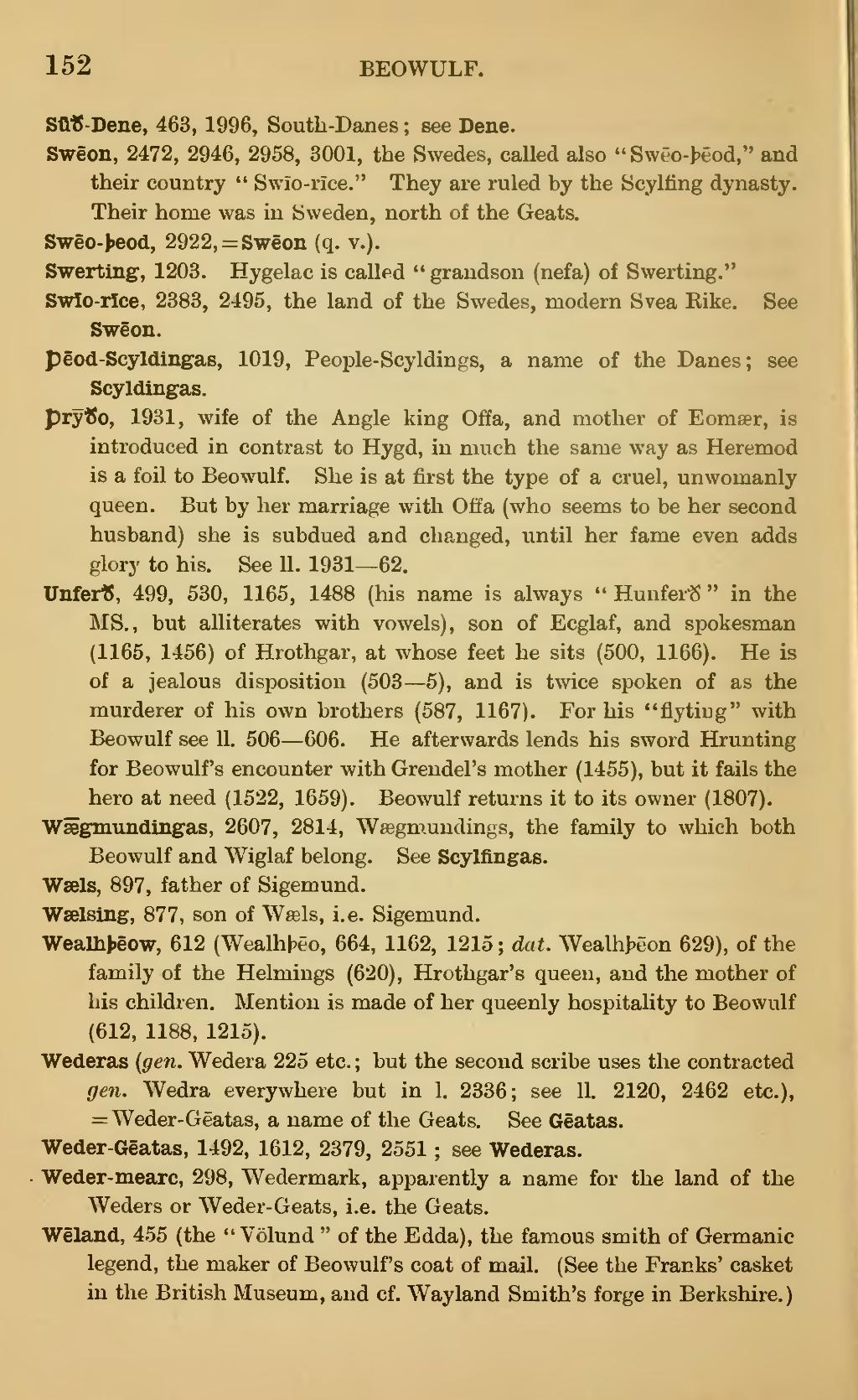152
BEOWULF.
Sūð-Dene, 463, 1996, South-Danes; see Dene.
Swēon, 2472, 2946, 2958, 3001, the Swedes, called also “Swēo-þēod,” and their country “Swīo-rīce.” They are ruled by the Scylfing dynasty. Their home was in Sweden, north of the Geats.
Swēo-þeod, 2922, = Swēon (q. v.).
Swerting, 1203. Hygelac is called “grandson (nefa) of Swerting.”
Swīo-rīce, 2383, 2495, the land of the Swedes, modern Svea Kike. See Swēon.
Þēod-Scyldingas, 1019, People-Scyldings, a name of the Danes; see Scyldingas.
Þrȳðo, 1931, wife of the Angle king Offa, and mother of Eomær, is introduced in contrast to Hygd, in much the same way as Heremod is a foil to Beowulf. She is at first the type of a cruel, unwomanly queen. But by her marriage with Offa (who seems to be her second husband) she is subdued and changed, until her fame even adds glory to his. See ll. 1931—62.
Unfertð, 499, 530, 1165, 1488 (his name is always “Hunferð” in the MS., but alliterates with vowels), son of Ecglaf, and spokesman (1165, 1456) of Hrothgar, at whose feet he sits (500, 1166). He is of a jealous disposition (503—5), and is twice spoken of as the murderer of his own brothers (587, 1167). For his “flyting” with Beowulf see ll. 506—606. He afterwards lends his sword Hrunting for Beowulf’s encounter with Grendel’s mother (1455), but it fails the hero at need (1522, 1659). Beowulf returns it to its owner (1807).
Wǣgmundingas, 2607, 2814, Wægmundings, the family to which both Beowulf and Wiglaf belong. See Scylfingas.
Wæls, 897, father of Sigemund.
Wælsing, 877, son of Wæls, i.e. Sigemund.
Wealhþēow, 612 (Wealhþēo, 664, 1162, 1215; dat. Wealhþēon 629), of the family of the Helmings (620), Hrothgar’s queen, and the mother of his children. Mention is made of her queenly hospitality to Beowulf (612, 1188, 1215).
Wederas (gen. Wedera 225 etc.; but the second scribe uses the contracted
gen. Wedra everywhere but in l. 2336; see ll. 2120, 2462 etc.), = Weder-Gēatas, a name of the Geats. See Gēatas.
Weder-Gēatas, 1492, 1612, 2379, 2551; see Wederas.
Weder-mearc, 298, Wedermark, apparently a name for the land of the Weders or Weder-Geats, i.e. the Geats.
Wēland, 455 (the “Völund” of the Edda), the famous smith of Germanic legend, the maker of Beowulf’s coat of mail. (See the Franks’ casket in the British Museum, and cf. Wayland Smith’s forge in Berkshire.)
